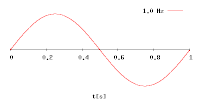Key:frequency
(Redirected from Tag:frequency=16.7)
Jump to navigation
Jump to search
| Description |
|---|
| For describing the frequency of electric power supply networks and devices, electrified railways or buses, and communications devices. The unit is Hz (cycles per second). |
| Group: properties |
| Used on these elements |
| Useful combination |
|
| Status: de facto |
| Tools for this tag |
|
This key describes the frequency of:
- Power power=generator, power=transformer, power=circuit preferably and controversial lines, cables, substations and similar passive objects
- Electrified railways, trams, buses or other means of transportation (railway=rail)
- Communication devices for broadcasting and two-way telecommunications (man_made=antenna)
This key is for the frequency in a scientific/engineering sense. By contrast, the interval=* and duration=* keys describe the period (which is also called "frequency" in colloquial English).
Unit
The unit of the frequency is always hertz (cycles per second). Values lower than 1000 Hz should have no unit (frequency=50). For greater values, the SI units 'kHz' (frequency=423 kHz), 'MHz' (frequency=88.0 MHz), or 'GHz' (frequency=2.4 GHz) should be used. The unit should be separated by a space from the value. A decimal separator '.' should always be used.
Examples
| frequency= | 0 | For DC. This is used for most buses, trams, metros or light rail systems, as well as some railways (Italy, Slovenia) and continental HVDC lines. |
| 16.67 | For the railways with overhead lines in Sweden, Norway and Germany. In Germany only for railways which are not fed from the railway power grid (as in some regions in Mecklenburg-Vorpommern, Sachsen-Anhalt and Brandenburg). | |
| 16.7 | For the railway power grids in Germany, Austria and Switzerland. Also for the railways with overhead lines, which are fed from these power grids (in Austria, Switzerland and most parts of Germany). | |
| 25 | For the railway power grids in USA North-East region (DC, MD, DE, PA, NJ, NY) and for the railways with overhead lines, which are fed from these power grids (Washington DC - Bowery Bay Phase Break, SEPTA lines). | |
| 50 | For the power grids in Europe, Australia and most parts of Africa, Japan in east region and Asia (see Wikipedia), also for some railways with overhead lines in these countries. | |
| 60 | For the power grids in North America, most parts of South America, Japan in west region and some other countries (see Wikipedia), also for some railways with overhead lines in these countries. | |
| 283 - 325 kHz | For beacons sending differentiated GPS corrections (so called dGPS beacons) dGPS - GNSS Pro Reference Stations. | |
| 426 kHz | For NDB (an aviation navigation device) MIQ in Germany. | |
| 76 - 108 MHz | For VHF FM radio broadcasting (also OIRT 65.9 - 74 MHz). | |
| 112.80 MHz | For VOR (an aviation navigation device) WLD in Germany. | |
| 470 - 960 MHz | For UHF television broadcasting. |
For more details about the difference between frequency=16.67 (16 2⁄3) and frequency=16.7, consult Wikipedia.
